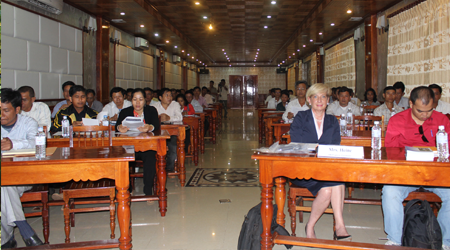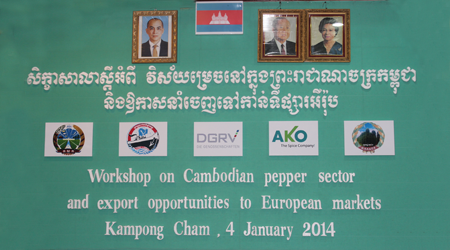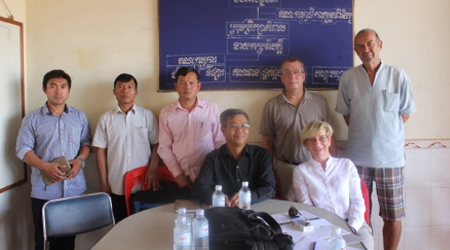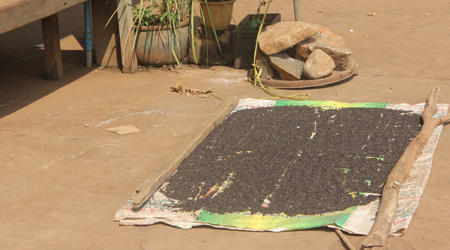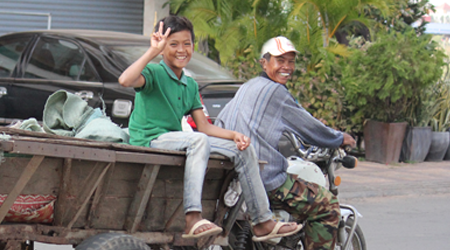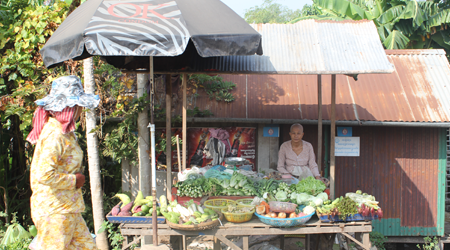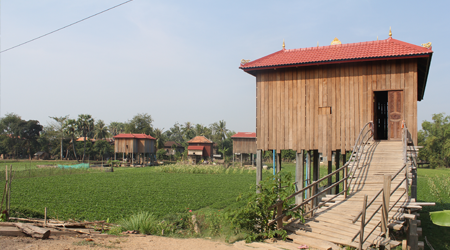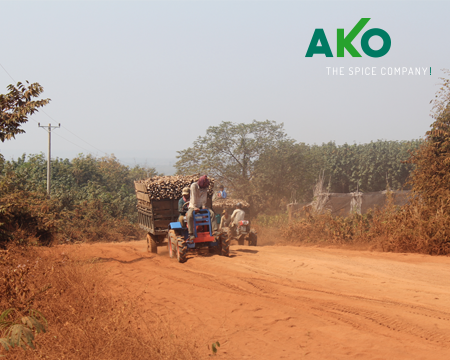They were starting quite early in the morning, our Cambodian pepper farmers. 70 farmers had been picked up by bus at 4 o’ clock in the morning in Memot/Cambodia in order to attend the AKO workshop in Kampong Cham. Driving on dusty and badly maintained roads. Their goal: to take part in our “Workshop on Combodian Pepper Sector and Opportunities to export to Europe”. And they certainly were pretty tired even before the official part of the speeches in the hotel Phnom Pos was finished. However, we were tired, too. After all, we had a 11.000 kilometers journey behind us, including a little detour to Vietnam and a 6 hours trip from Ho Chi Minh City/Vietnam to Kampong Cham/Cambodia. During the days before our workshop, we had been visiting the pepper plantations as well as the Dar Commune in Cambodia, which is, given the very bad roads and the high temperatures, a dusty and exhausting adventure.
The Cambodian “officials”, however, were less tired. After all, they had arrived with their entourage the day before from Phnom Penh which is only 2 hours away, not to mention their stay in the best hotel of the city. After having listened to the national anthems in the beginning of the event, they were talking about the successful development of agriculture in Cambodia. They kept talking for quite a while and one could see the farmers getting more and more nervous. Finally, Klaus Peter Glatzel, the local development consultant who had organized the whole meeting announced the AKO presentation. After a little break everyone expected to hear what Europeans expect from Cambodian pepper. During the break and after a couple of interviews by the local TV broadcasts, the officials drove back to Phom Penh – just before the AKO presentation could be held. After all, it was their Saturday, their free day and therefore not an official working day!
The farmers’ body languages changed when we started our presentation after the break. They were sitting upright, listening attentively to what our interpreter was telling them in Khmer. None of the listeners had ever visited a European country and they just couldn’t imagine why food safety is an issue in Europe.
In Europe, food-stuff is bought mainly in the supermarkets and not from the local markets. In Cambodia situation is just the other way round: most of food is being produced and consumed in families and only a small part is bought on the market. However, some supermarkets already exist in Cambodia – approx. 10 supermarkets in the capital Phnom Penh and some in the big cities. So the risks of spreading diseases via supermarkets are very low. Of course there are other risks in Cambodia – due to insufficient cooling or insufficient hygienic conditions.
Stomache pains are considered as normal and not as disease.
Why do the European Legislations or the European Certification bodies have most demanding needs and highest demanding quality standards for subjects which are considered marginal in Cambodia? A country still facing existential hardships. Humidity, playing dogs, rubbish, and clean water: those European issues are not easy to understand for Cambodian people, living at the subsistence level. Hard to understand for people, of whom only 50 % have access to tap water and sanitation facilities. A specific problem for our interpreter: there is no word in KHMER language for microbiology. No word for GERMS. Beside some practical tips how to plant, harvest and dry pepper, how to pack and to do the storage, AKO gave a lot of information during the presentation. At the end every farmer got an AKO brochure with these hints, as a collective work of Mr. Glatzel and AKO The Spice Company! After the presentation was finished Mr. Richter got a thunderous applause and a big thank you from the farmers.
After the European experience with the careless intake of pesticides in Vietnam, the Cambodian pepper seemed to be an alternative. After extensive researches, we found an expert in Pepper in Cambodia, Mr. Klaus Peter Glatzel. He was a development manager of the German Foundation DRGV and led the project of the pepper farmers in the Dar Commune/Cambodia. Experienced in pepper business, with a lot of energy and enthusiasm he built up this community. His success was not only the planning, but also the implementation and realization of the project. Especially an implementation is not very easy in countries like Cambodia, as communication, logistic and procurement are still very complicated.
The project ended in 2013/2014 and since that time the Dar Commune is eager to manage the pepper plantation them self. Unfortunately warehouses, export-licenses and experiences are still missing, to get independent from local and Vietnamese dealers.
After the project ended, Mr. Glatzel worked as an in depended consultant in the Dar Commune. Today, he is facing a new promising project of a new investor in the South of Cambodia. We still have a friendly relationship and we wish him all the best for his new duties.
Cambodia is one of the poorest Asian countries, with a sad history, which has paralyzed the country by now. After the French protectorate, the Japanese took over the country and after that the French occupied again Cambodia (Indochina). The fruitless attempts of King Shianouk, to keep Cambodia apart from the war, led to a Vietnam invasion. Shianouk escaped to Peking, founded the National United Front of Kampuchea and associated with National Army (Khmer Rouge), who invaded Cambodia during the civil war. Thence followed by the sad period when Pol Pot took over, who tried to implement the Stone Age Maoism in Cambodia. He tried to implement the Agrarian Communism and Shianouk had to resign. This process also includes the expulsion of the capitals population of Phom Penh
and led to organized mass murdering of the population. Up to the end of their rule, the Khmer Rouge killed more than 1, 7 bn Cambodians. Afterwards the Vietnames invaded the country again followed by the underground war of the Khmer Rouge. Cambodia could not find a rest. As one of Asia’s poorest nations, it belongs to the “least developed countries”. A large share of the national budget comes from development assistance projects, such as from China, Korea, Vietnam and Malaysia. European and American investors are very slow in coming forward due to a lack of clarity in ownership, legal statements and corruption in Cambodia. From 1947 on, more than 10.000 development projects had been launched in Cambodia. And our Pepper farmers were part of one of them.

